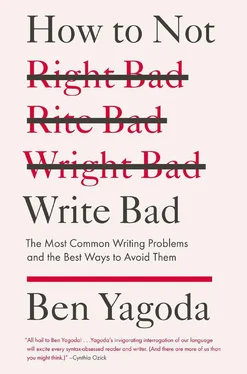[ He seen it coming. ]
He saw it coming.

[ I had went to watch that movie when it first come out. ]
I had gone to watch that movie when it first came out.
a. Subjunctive
The subjunctive mood has been losing sway in the English language over the centuries, but it’s still got some sway left. Basically, the subjunctive calls for a shift in the verb to be in reference to untrue scenarios; the word if is usually a giveaway.
[ If I was you, I would take that class. ]
If I were you, I would take that class.
Note that if the scenario followed by if is not necessarily untrue — that is, if it’s in doubt — the standard past tense is called for, and the subjunctive is hypercorrection.
[ I asked him if he were happy with our marriage. ]
I asked him if he was happy with our marriage.
[ Check what’s in the refrigerator to find out if he were in the house last night. ]
Check what’s in the refrigerator to find out if he was in the house last night.
b. Like (III)
Like still doesn’t cut the mustard when it’s followed by in :
[ Like in France, American TV is a case of dumb and dumber. ]
As in France, American TV is a case of dumb and dumber.
That’s an easy fix, but a comparable misuse of unlike is more challenging.
[ Unlike in the higher atmospheres, airplanes frequently encounter turbulence when they’re about to land. ]
Airplanes often run into turbulence when they’re about to land. That’s not true in higher atmospheres.
c. (Don’t) Let ’Em Dangle
A similar like mistake is:
[ Like his first trial, Morgan was acquitted. ]
Again, the fix is to use as in:
As in his first trial, Morgan was acquitted.
This error is an example of a dangling modifier. Here are some more examples from students’ writing:
[ By including several charts along with the story, readers are encouraged to understand the long-term trends. ]
[ Being the most spectacular event of the year, newspapers were obligated to devote major coverage to the hurricane. ]
[ As an expert on fiscal recovery, his comments were listened to with intense interest. ]
[ By reversing the color scheme, the eye is captured. ]
[ Claiming to be a simple man leading an ordinary life of a male as he enjoys watching football with his buddy’s, Smith’s lifestyle is far from ordinary ]. (For buddy’s, see “Apostrophes,” II.B.1.)
(From a review of a new bra by Victoria’s Secret) [ Sitting in class or dancing at the bar, the bra performed well…Though slightly pricey, your breasts will thank you. ]
The grammatical problem in those sentences (and I apologize if I seem to be stating the obvious) is that Morgan didn’t resemble his first trial; readers didn’t include the charts; newspapers were not the most spectacular event; the eye doesn’t reverse the color scheme; his comments were not an expert; Smith’s lifestyle didn’t claim to be a simple man; the bra doesn’t sit in class or dance at a bar; and the reader’s breasts are not pricey. (Pause for snarky comment.) In each case, the italicized word or phrase is the subject of the sentence, and the opening phrase — up to the comma, that is — has to modify, describe, or characterize the subject and nothing but the subject.
To get technical for just a minute, I’ll note that this is a problem only with introductory phrases (which do not contain a subject and verb), not clauses (which do). So there is no dangler issue in the following:
Since he is running for mayor next year, he is resigning all his board memberships. (Opens with dependent clause.)
Kris is the starting center on the basketball team, but Jessica wants to replace her. (Opens with independent clause.)
An interesting thing about danglers is that a rather select group of writers commit them: the minority who would even attempt a complex sentence. They haven’t quite mastered the skill of putting one of these together, and thus can get themselves in rather spectacular trouble, but at least they realize that this level of complexity is, as Hamlet said, a consummation devoutly to be wished.
Relevant as well is that danglers are very common — and, to a certain extent, acceptable — in speech. When talking, some “mistakes” are okay. Did you notice that the previous sentence has a dangling modifier (mistakes don’t talk)? In conversation, I bet you wouldn’t. As another example, let’s suppose I’m speaking with someone who’s an expert in ancient religion, and I say: “As an expert in ancient religion, I wonder what you think of devil worship.” That is a dangling modifier: “I” am not a religion expert. In speech, we give this a pass. In writing, we — and by we I mean the professors and editors of the world — do not.
That’s unfortunate, because danglers spring incessantly from many writers’ fingers; it takes a substantial amount of discipline and rigor to prune them from our prose. (If you haven’t guessed, I am one of those writers.) Consequently, much more so than the other errors on my list, they show up in well-respected publications, such as the New York Times Book Review ( rather than providing the meticulous examination of the process of looking…we are treated to rhetorical flights that provide little perspective of any useful kind ), the New Yorker ( A major political donor, his greatest concern is to protect Israel ), and the Chronicle of Higher Education ( Having made it successfully through all three gantlets, all of the rejections I experienced along the way have become only vague memories ).
How to avoid danglers? A simple strategy will help you smoke these bad boys out. First of all, you have to recognize sentences that have this structure: MODIFIER-COMMA-SUBJECT-VERB. The vast majority of the time, the part of such a sentence before the comma will either:
Begin with Like, Unlike, or As . (Example: Like most of the student body, Rogoff has spent an inordinate amount of time avoiding hard classes. )
Contain a gerund, that is, a verb in the —ing form. ( Being an inquisitive sort, I wonder what you ate for breakfast. )
Begin with the infinitive form of a verb. ( To maximize your chances of losing weight, you should avoid fried food. )
Begin with one or more participles. ( Shaken and not stirred, James Bond’s martinis are a twentieth-century icon. )
Consist of a noun phrase. ( A popular mayor, Potter is running unopposed for reelection. )
Once you recognize the sentence, circle the subject, the modifier, and the verb. Then see if it makes sense if you keep all the elements but change the order to this: SUBJECT-COMMA-MODIFIER-COMMA-VERB. If it does — as in all of the examples above — you’re good to go. If it doesn’t, you have a dangler.
So take one of my students’ troubled sentences:
[ Being the most spectacular event of the year, newspapers devoted major coverage to the hurricane. ]
Shifted, it would be:
[ Newspapers, being the most spectacular event of the year, devoted major coverage to the hurricane. ]
Obviously no good. There are any number of ways to fix this sentence. Probably the best thing to do is to follow the student’s original instinct and start with the hurricanes. So:
Читать дальше













